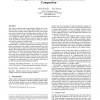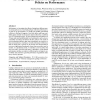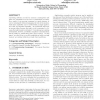16 search results - page 2 / 4 » Concurrent Garbage Collection Using Program Slices on Multit... |
PLDI
2006
ACM
13 years 11 months ago
2006
ACM
The widely used Mark-and-Sweep garbage collector has a drawback in that it does not move objects during collection. As a result, large long-running realistic applications, such as...
ASPLOS
2009
ACM
14 years 6 months ago
2009
ACM
The growth in complexity of modern systems makes it increasingly difficult to extract high-performance. The software stacks for such systems typically consist of multiple layers a...
IWMM
2009
Springer
14 years 1 days ago
2009
Springer
In this paper, we investigate the effects of using three different nursery sizing policies on overall and garbage collection performances. As part of our investigation, we modify ...
POPL
2007
ACM
14 years 5 months ago
2007
ACM
A memory leak in a garbage-collected program occurs when the program inadvertently maintains references to objects that it no longer needs. Memory leaks cause systematic heap grow...
IWMM
2004
Springer
13 years 11 months ago
2004
Springer
Operating systems account for memory consumption and allow for termination at the level of individual processes. As a result, if one process consumes too much memory, it can be te...



